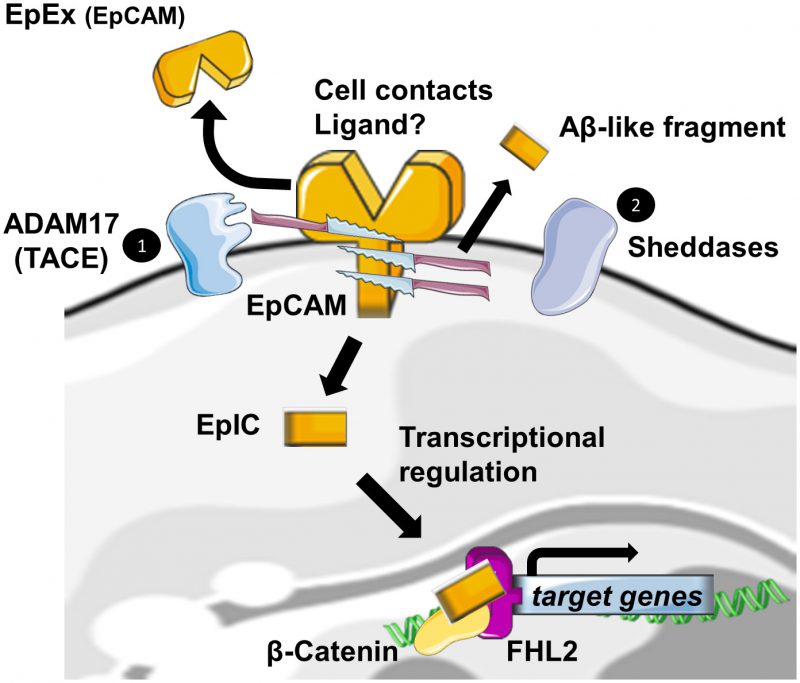Introduction to CD3
CD3 (cluster of differentiation 3) is a cell surface complex composed of four different subunits: CD3γ, CD3δ, CD3ε and CD3ζ. These subunits belong to the immunoglobulin superfamily and contain an extracellular immunoglobulin domain and an intracellular immunoreceptor tyrosine-based activation motif (ITAM). CD3 interacts with the T cell receptor (TCR) and participates in T cell surface expression and signal transduction. CD3 is mainly expressed on mature T cells and is an important marker of T cell activation and function. CD3 plays a key role in various immune-related diseases, such as autoimmune diseases, transplant rejection and tumor immune escape.
Introduction to EpCAM
EpCAM (epithelial cell adhesion molecule), also known as CD326, EGP40, KSA, etc., is a single-pass type I transmembrane glycoprotein that mediates Ca2+-independent homotypic cell adhesion. EpCAM is encoded by the EPCAM gene and contains an extracellular N-terminal epithelial cell adhesion domain (EpEX) and an intracellular C-terminal epithelial cell signaling domain (EpICD). EpCAM is not only involved in cell adhesion, but also in cell signaling, proliferation, differentiation, organ formation and maintenance. EpCAM is expressed in various epithelial tissues, as well as on the cell surface of various stem cells and progenitor cells. EpCAM is also highly expressed in epithelial tumor tissues, promoting tumor proliferation and contributing to tumor development and metastasis. Human EpCAM gene mutations are associated with congenital tufting enteropathy.

Fig.1 Reduced schematic of EpCAM regulation in the context of EMT (Keller L, 2019)
Signaling Pathways Involved in Bispecific Antibodies Targeting CD3 and EpCAM
Bispecific antibodies targeting CD3 and EpCAM can simultaneously recognize T cells and tumor cells, thereby achieving tumor immunotherapy effects. These antibodies mainly act through the following signaling pathways:
-
TCR/CD3 signaling pathway: When the bispecific antibody binds to CD3 on T cells, it induces the aggregation and activation of the TCR/CD3 complex, leading to the phosphorylation of ITAMs and the activation of downstream signaling molecules such as ZAP70, LAT, PLCγ, etc. These signaling molecules further activate MAPK, NF-κB and Ca2+ signaling pathways, promoting T cell proliferation, differentiation, effector molecule release and cytotoxicity.
-
EpCAM signaling pathway: When the bispecific antibody binds to EpCAM on tumor cells, it induces the cleavage and internalization of EpCAM, releasing EpICD. EpICD forms a complex with FHL2, β-catenin and Lef-1 proteins, translocates to the nucleus, and regulates the transcription of downstream genes, such as c-myc, cyclin A/E, etc. The expression of these genes promotes tumor cell proliferation and invasion.
-
Immune checkpoint signaling pathway: When T cells interact with tumor cells, they are inhibited by immune checkpoint molecules such as PD-1, CTLA-4, etc., leading to T cell dysfunction and tumor immune escape. Bispecific antibodies targeting CD3 and EpCAM can counteract the negative regulation of the immune checkpoint signaling pathway by activating the TCR/CD3 signaling pathway, restoring T cell activity and efficacy.
Clinical Status of Bispecific Antibodies Targeting CD3 and EpCAM
Currently, bispecific antibodies targeting CD3 and EpCAM are mainly used for the treatment of epithelial tumors, such as colorectal cancer, pancreatic cancer, ovarian cancer, breast cancer, etc. Bispecific antibodies targeting CD3 and EpCAM are mainly developed by several companies or institutions, such as Amgen, Boehringer Ingelheim, Eli Lilly, Genmab, MacroGenics, Merus, MorphoSys, Shanghai Jiao Tong University, etc. These antibodies have different formats and structures, such as BiTE (single-chain bispecific antibody), DART (dual-affinity retargeting), DuoBody (dual-specific IgG), BAPTS (bispecific antibody with parallel T-cell stimulation), etc. Currently, these antibodies are mainly in phase I clinical trials, mainly for solid tumors such as colorectal cancer.
Table 1. Example of bispecific antibodies targeting CD3 and EpCAM in clinical trials
|
Drug name
|
Target
|
Format/structure
|
Developer
|
Clinical trial phase
|
Indication
|
|
AMG 110
|
EpCAM/CD3
|
BiTE (single-chain bispecific antibody)
|
Amgen
|
Phase I
|
Advanced solid tumors
|
References
1. Wang W, et al. CD3 Bispecific Antibody: A Review of Its Mechanism, Clinical Application, and Future Perspective. Front Immunol. 2020 Feb 28;11:332.
2. Keller L, et al. Biology and clinical relevance of EpCAM. Cell Stress. 2019 May 21;3(6):165-180.
3. Klinger M, et al. Bispecific T-cell engager (BiTE) antibody constructs can mediate bystander tumor cell killing. Proc Natl Acad Sci U S A. 2016 Sep 13;113(37):E5553-61.
4. Löffler MW, et al. Targeting EpCAM with BiTE antibody MT110 eliminates human colorectal cancer via lysis by human T cells in vivo. Cancer Immunol Immunother. 2011 Nov;60(11):1555-67.
5. Kiewe P, et al. Phase I trial of the trifunctional anti-EpCAM x anti-CD3 antibody catumaxomab in patients with malignant ascites. Eur J Cancer. 2006 Oct;42(15):2513-9.
6. Schmidt M, et al. Catumaxomab: clinical development and future directions. MAbs. 2015;7(2):374-81.
7. Baeuerle PA, et al. Bispecific T-cell engaging antibodies for cancer therapy. Cancer Res. 2009 Jun 15;69(12):4941-4.
8. Brischwein K, et al. MT110: a novel bispecific single-chain antibody construct with high efficacy in eradicating established tumors. Mol Immunol. 2006 Feb;43(8):1129-43.
9. Offner S, et al. EpCAM/CD3-Bispecific T-cell engaging antibody MT110 eliminates primary human pancreatic cancer stem cells. Clin Cancer Res. 2014 Jan 15;20(2):439-50.
10. Amann M, et al. Antitumor activity of an EpCAM/CD3-bispecific BiTE antibody during long-term treatment of mice in the absence of T-cell anergy and sustained cytokine release. J Immunother. 2009 Apr;32(3):313-23.
Our products and services are for research use only, and not for use in diagnostic or therapeutic procedures.
Welcome! For price inquiries, we will get back to you as soon as possible.
To order, please email
INQUIRY










